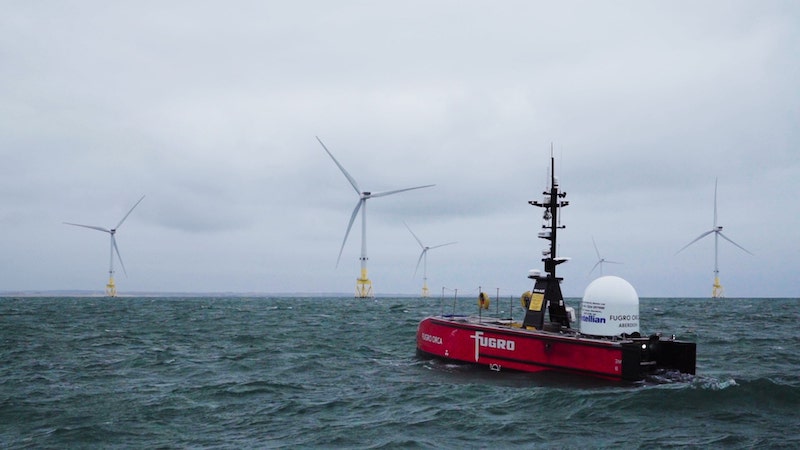
What is being described as “the world’s first” fully remote inspection of offshore wind farm assets has been successfully carried out by Fugro, using one of its Blue Essence uncrewed surface vessels (USVs) with Blue Volta, an electrical remotely operated vehicle (eROV).
The inspection at the Aberdeen offshore wind farm in the North Sea (also known as the European Offshore Wind Deployment Centre) was jointly funded by Vattenfall and Offshore Renewable Energy (ORE) Catapult.
This partnership gives innovators in the offshore wind supply chain the opportunity to test and prove technologies in real-world conditions to support innovation in operations and maintenance.
Blue Essence is the first USV to receive approval from the Maritime and Coastguard Agency (MCA) to operate fully remotely with an eROV and undertake surveys in UK waters.
The eROV, which was remotely launched and recovered from Fugro’s remote operations centre (ROC) in Aberdeen, delivered a number of inspections on the structure of the wind turbines to assess their stability and safety.
A detailed map of the seabed was also created using data gathered from a deepwater multibeam echosounder sensor mounted on the hull of the vessel. The acquired Geo-data was accessed in real-time, allowing Vattenfall to make quick decisions about their asset maintenance programme.
Blue Essence forms part of Fugro’s wider strategy towards more uncrewed operations for greater agility, safety and sustainability; the vessel can spend up to two weeks executing inspection activities at sea without refuelling resulting in a 95 percent reduction in carbon emissions compared to conventional ROV support vessels.
Håkan Borgström, deputy director, O&M product line, offshore wind at Vattenfall, says: “This is a technology that could signify a real step forward for the industry, particularly from a safety perspective – reducing the need to deploy teams offshore, with survey work instead able to be managed from onshore.
“As projects become increasingly far out to sea, this will also mean significantly lower carbon emissions which is a vital part of Vattenfall’s mission to deliver fossil-free living within a generation.”
Nick Simmons, Fugro’s USV and remote working director for Europe and Africa, says: “This is a landmark moment for offshore operations and demonstrates how remote technologies are bringing significant benefits to the offshore wind industry.
“Our USVs can be operated from our global network of ROCs, allowing us to deliver faster and more sustainable inspection and geophysical services from onshore locations, which are also much safer for crew than the offshore environment.”
